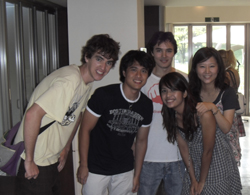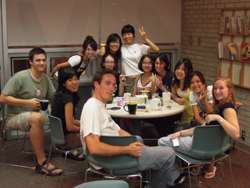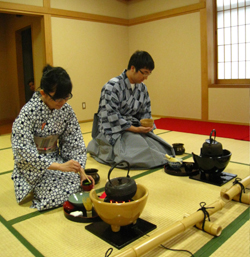Be Confident and Challenge Many Things
By Rhee Eun-jeong, Overseas Correspondent

From the 2008 fall semester I got the chance to take part in a student exchange program for one year at Osaka University. This opportunity allowed me to encounter various cultures and make a lot of foreign friends. I took many classes with multicultural students, so the international environment helped me to face mixed cultures and broaden my mind as well. Additionally, this was a good time to think about myself and become independent. I am sure that many students are already planning to study abroad. Here are some tips that you might help you.
First, you must be fluent enough to be able to have a conversation in the local language. In my case, I went to Japan even though I had studied English for a long time. To help me get used to Japanese society and school life I decided to learn Japanese. Afterwards I realized that it was a good decision because knowing the local language made it easier to mix with people. Secondly, it is good to pay attention to all the bulletin boards on campus. Usually on the boards there is information that a student might need. Lastly, it is important to be confident and challenge many things. Since studying abroad is a rare opportunity, do not hesitate to talk to new people and explore new places. Remember, having a good mindset is the most important thing. I hope these tips will help you make the most of your time in a foreign country.
Developing Acceptance toward Other Cultures
By Lim Ji-young, Overseas Correspondent

A month ago, Mitsuki, one of my close friends, visited my hometown, Gwangju. As exchange students in America, Mitsuki and I took many classes together and lived in the same dorm. We became best friends: We studied together, we partied together, and we consoled each other whenever we felt homesick. We promised that we would visit our respective home countries, Korea and Japan, after finishing our studying abroad programs. Last month, she left Tokyo for a three-day sojourn in Gwangju.
My family and friends were surprised when I announced her visit. They remembered that, before my year abroad, I abhorred Japan because of many historical grievances against our country. However, I was forced to re-evaluate my prejudices when I first met Mitsuki. She was friendly and funny, and she did not begrudge my Korean heritage. Therefore, I asked myself: Why should I begrudge her Japanese ancestry? And I came to appreciate Japanese people and culture through Mitsuki.
Over the ten months I spent abroad, my abhorrence of Japanese people gradually became acceptance thanks to the student exchange program. For this reason alone I strongly recommend that all students study abroad. It will challenge your point of view, prejudices, and pre-conceived notions about people of other nationalities and cultures; on the flip side, it also enables you to see your own country and culture in a more objective light. A certain measure of intellectual growth and maturity is just one of the many benefits of studying abroad. If you are considering applying for the student exchange program, then just go for it. You won't regret it.
Do away with Your Prejudices
By Kim Jun-hyung, Overseas Correspondent

The book, “Chrysanthemum and Katana”, which was published a long time ago, helped me reconceptualize my biased idea that Japanese people are difficult to make friends with, because of their dualistic characteristics. However, the process of making relationships with my advisor, tutor, and the others was not different from that in Korea. Japan and Korea are different, but they have a lot in common such as appearances, using Chinese characters and even some ways of thinking.
From this perspective, I would like to give three tips for having a wonderful time in a foreign country. First, take part in local communities and volunteer in popular festivals or ceremonies, and you will understand traditional culture and values quickly. Second, join the clubs that meet your interests, and you will have a good opportunity to approach local students who share the same passion for certain topics. Third, have confidence. You cannot make your opportunities unless you have confidence. If you are invited to a party, do not hesitate to talk, do not worrying about your lack of your language skills. One last tip, study your target language until you leave Korea, trying as best you can to increase your fluency. The ability guarantees a lot of friends and good credit.

